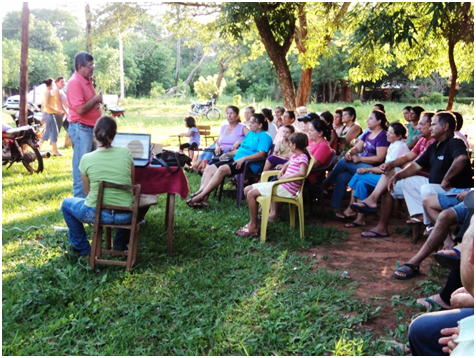Development Study for the Formulation of Strategy for Sustainable Development of Rural Territories, Paraguay
 Agriculture in Paraguay has been the mainstay of the economy where the agricultural sector accounts for 48% of the nation’s employment, 23% of GDP, and 98% of export earnings. One of the endemic problems in rural development is unequal distribution of land ownership, where 81% of the land is controlled by 10% of the population, leaving small-scale producers vulnerable to economic shocks. Thus the Government of Paraguay (GOP) placed poverty reduction and support for socially vulnerable people as its top priority, and aimed to articulate a set of policy measures to address them. In particular, the GOP recognized a critical need to formulate a long-term strategy for rural development and a mechanism that re-orients these institutions and organizations toward participatory, coherent, and sustainable development in rural areas.
Agriculture in Paraguay has been the mainstay of the economy where the agricultural sector accounts for 48% of the nation’s employment, 23% of GDP, and 98% of export earnings. One of the endemic problems in rural development is unequal distribution of land ownership, where 81% of the land is controlled by 10% of the population, leaving small-scale producers vulnerable to economic shocks. Thus the Government of Paraguay (GOP) placed poverty reduction and support for socially vulnerable people as its top priority, and aimed to articulate a set of policy measures to address them. In particular, the GOP recognized a critical need to formulate a long-term strategy for rural development and a mechanism that re-orients these institutions and organizations toward participatory, coherent, and sustainable development in rural areas.
The IC Net team of experts conducted a development study for the formulation of integrated rural development plan for small-scale producers by gathering information from seven ministries and agencies. The purpose of this study was to assist the GOP in formulating a strategy for sustainable development of rural territories that could enhance quality of life of rural Paraguayans through appropriate management of territories. The deliverable called the Guideline for National Strategy for Sustainable Development of Rural Territories proposed to drive rural development from four dimensions: (i) Policy and Institution (good governance as a result of efficient and transparent functions of institutions); (ii) Economy and Production (competitiveness arising from utilizing and integrating all potentials related to rural economy and production); (iii) Society and Culture (social equity that ensures redistribution to people according to their respective efforts); and (iv) Environment (sustainable use of and respect for environment and natural resources). The Guideline was adopted by the GOP, and contributed to harmonizing actions of various sectors, generating synergy, improving efficiency in public financial management, and making the public sector responsive to the needs of rural areas as a promoter of participatory management in rural territories.